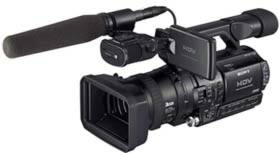
This post on "taking care of your camcorder" is a continuation of the previous post on digital filmmaking blog.
Cleaning the Camcorder
Some camcorders react badly to being cleaned with benzine or thinners. The body casing can be deformed as a result. Use a soft cloth with mild, dilute detergent mixed with water. Wring out the cloth until nearly dry before use. Never clean the camera while the battery or mains supply is attached.
Clean lenses rarely, and with great care. Avoid getting the lens dirty. Try fitting a protective clear UV filter (semi) permanently to the front of the lens if the camera has a filter thread fitted. You can always buy another cheap filter when it gets damaged.
Cleaning the video recording heads is advised, but with care. Sometimes, after a lot of use, dirt and tape particles build up on the video heads, obstructing perfect quality recording. Some cameras tell you when this is happening, with a display on the monitor. To clean the heads, get hold of a cleaning cassette, which cleans as it plays. But don't do this too often, the cleaning cassette is an abrasive cleaner.
Camera Battery Care
Batteries for many camcorders work by generating electricity through a chemical reaction, using lithium. The reaction is easily affected by temperature and humidity, and impedes the amount of power you get from it. At very cold temperatures, a battery may have its life-span cut down to just 5 minutes, while high temperatures may cause the battery to switch off for some time.
Using the LCD monitor
Temperature will affect picture quality on an LCD monitor. When cold, the picture is darker than usual, even in reasonable climates. After a while the ambient heat of the camera is enough to rectify this, but bear it in mind if you use the monitor in cold environments. Over 100 000 pixels are used on these monitors but less than 1 per cent will be inactive, sometimes affecting picture quality. Don't worry about this as it does not affect recorded picture quality.
Remember that using the LCD monitor will run down the power in the battery much faster than if you use only the viewfinder; a one hour life-span is reduced to 30 minutes when using the monitor.
Filmmaking
No comments:
Post a Comment